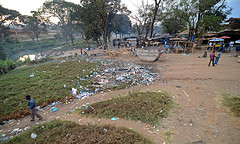Dez
More than one story – Street vending in Malawi
Clouded in the smoke that rises up from the debris of dismantled vending barracks the evening traffic lines up into Malawi’s capital city Lilongwe. That evening the normally bustling sideway stretches are deserted. Onions, cassava leaves and maize lie scattered on the sandy ground. Once more a Malawian Police ‘clean-up’ operation aimed at removing illegal street vendors clamped down on violent resistance. Vendors report how police officials fired rubber bullets and tear gas into the crowd before setting their market stalls on fire to prevent the vendors from returning. Two days later two police men seemingly unperturbed are busily bargaining with street vendors over two suit trousers at the other end of Malawi’s capital. Standing next to them the pavement-shopping bank clerk Benson explains that many would prefer the convenience and good prices in the streets over the markets.
While city by-laws in Malawi prohibit the unauthorized sale of goods such as staples or consumer goods outside of demarcated ‘flea markets’, oversimplified narratives about the causes for informal vending pervade and obscure the public discourse. As the two anecdotes suggest the debate about street vending is multi-facetted, it is dominated by vested interests and waged on various levels from complicit customers, profiting wholesalers, dutiful and corrupt police officials up to politicians. The result is a protracted situation in which a cycle of relocation orders, often excessively brutal evictions and the subsequent returns of the vendors becomes perpetuated that leaves the lives of thousands in turmoil.
The issue of sufficient space in the designated market areas appears to be the lynchpin of the debate waged in the streets and in the newspapers. “The challenge that we have had ever since the issue of relocation surfaced has been space and essential amenities like toilets,” explains Blantyre Vendors Association chairperson Innocent Mussa. Vendors have put it on their banners to leave the streets if more space in the markets were created for them. Officials hear their complaints, but widespread action is not taken. Rather, they bemoan that street vendors shirk taxes and market fees, thereby draining the public coffers that among others are supposed to fund market expansions. Mandasi-vending Owen retorts that amenities such as robust market infrastructure, security and proper sanitation facilities, which are supposed to be funded with tax money, would be woefully lacking.
This logic creates the impression of a situation that has become deadlocked.

